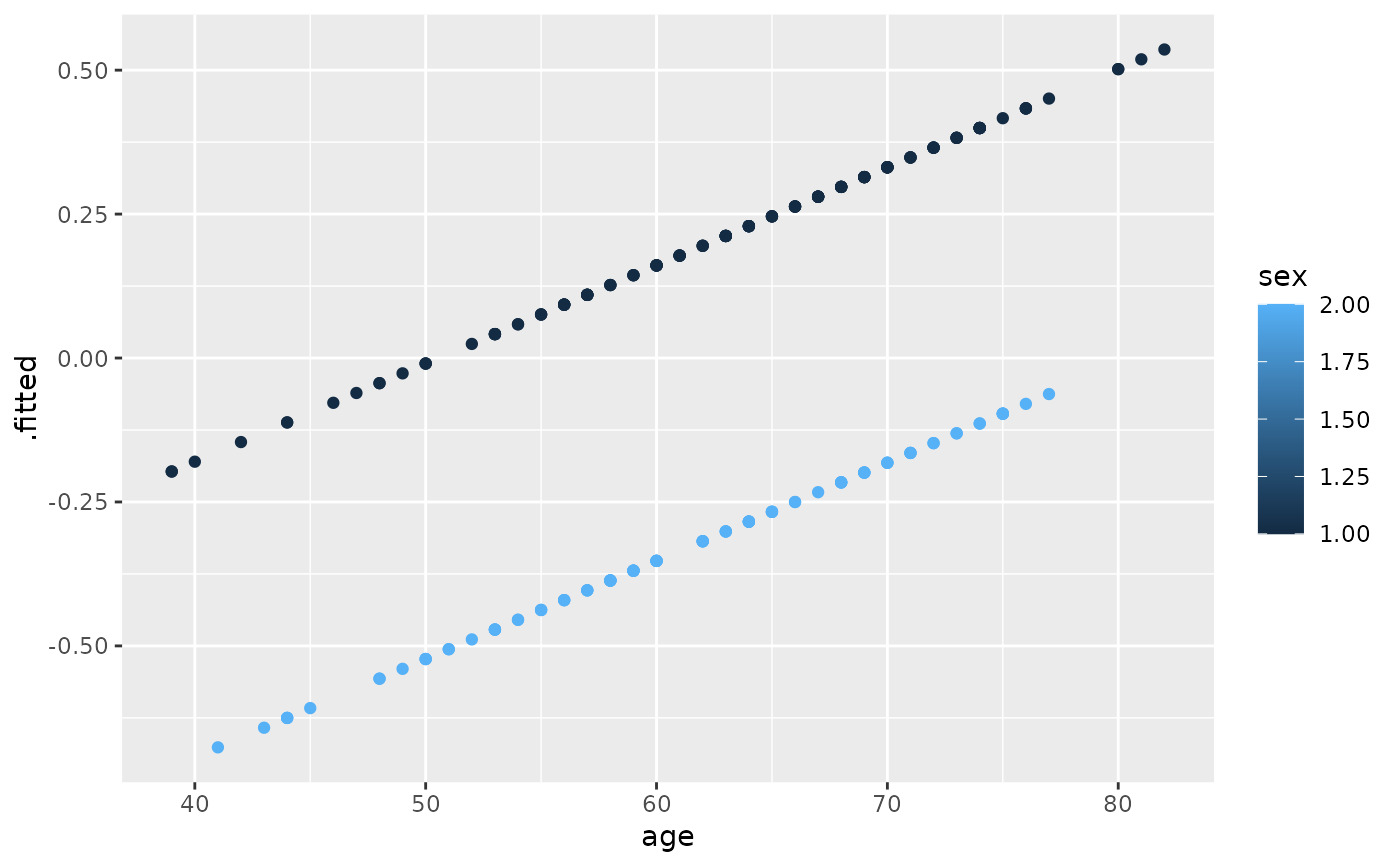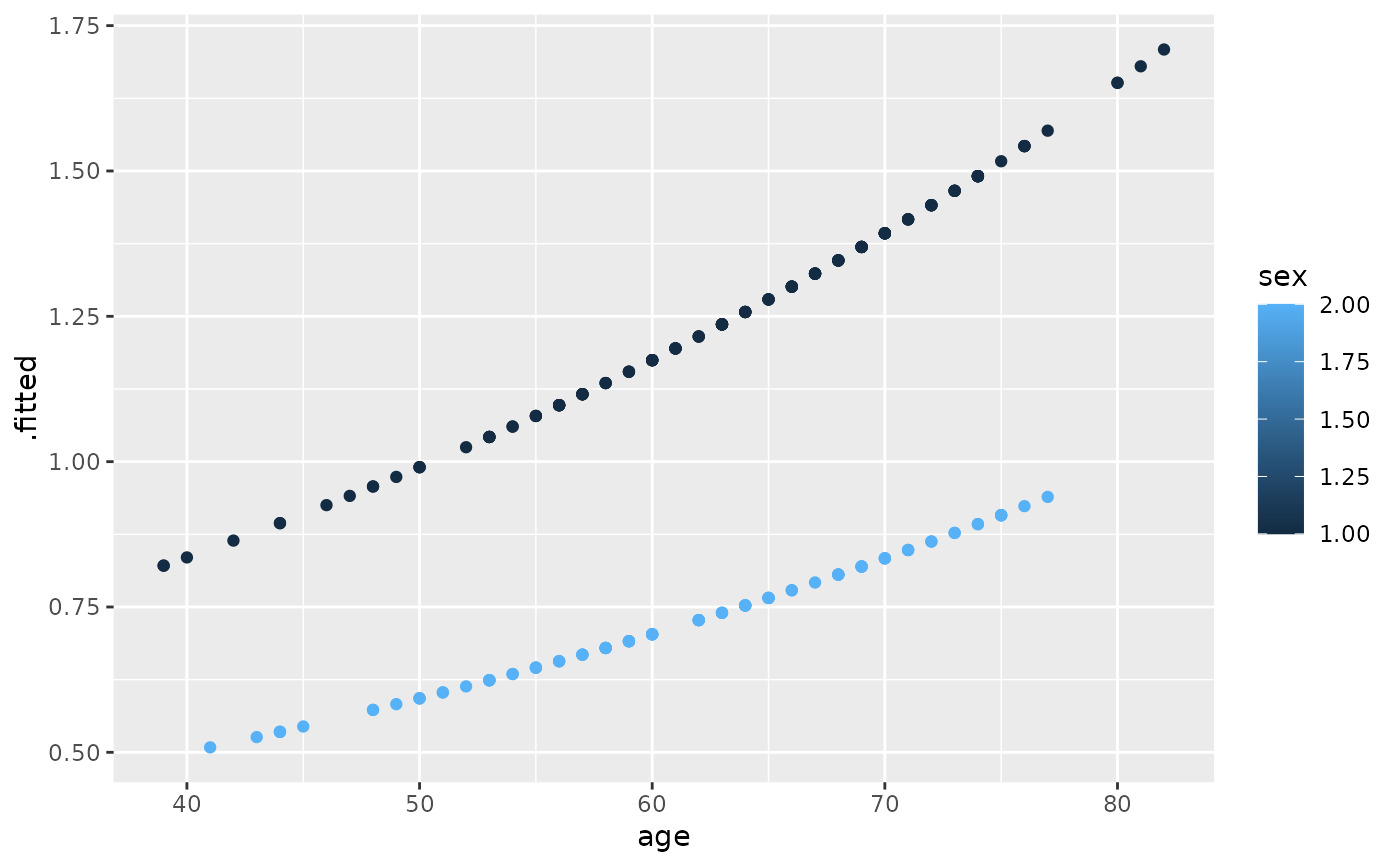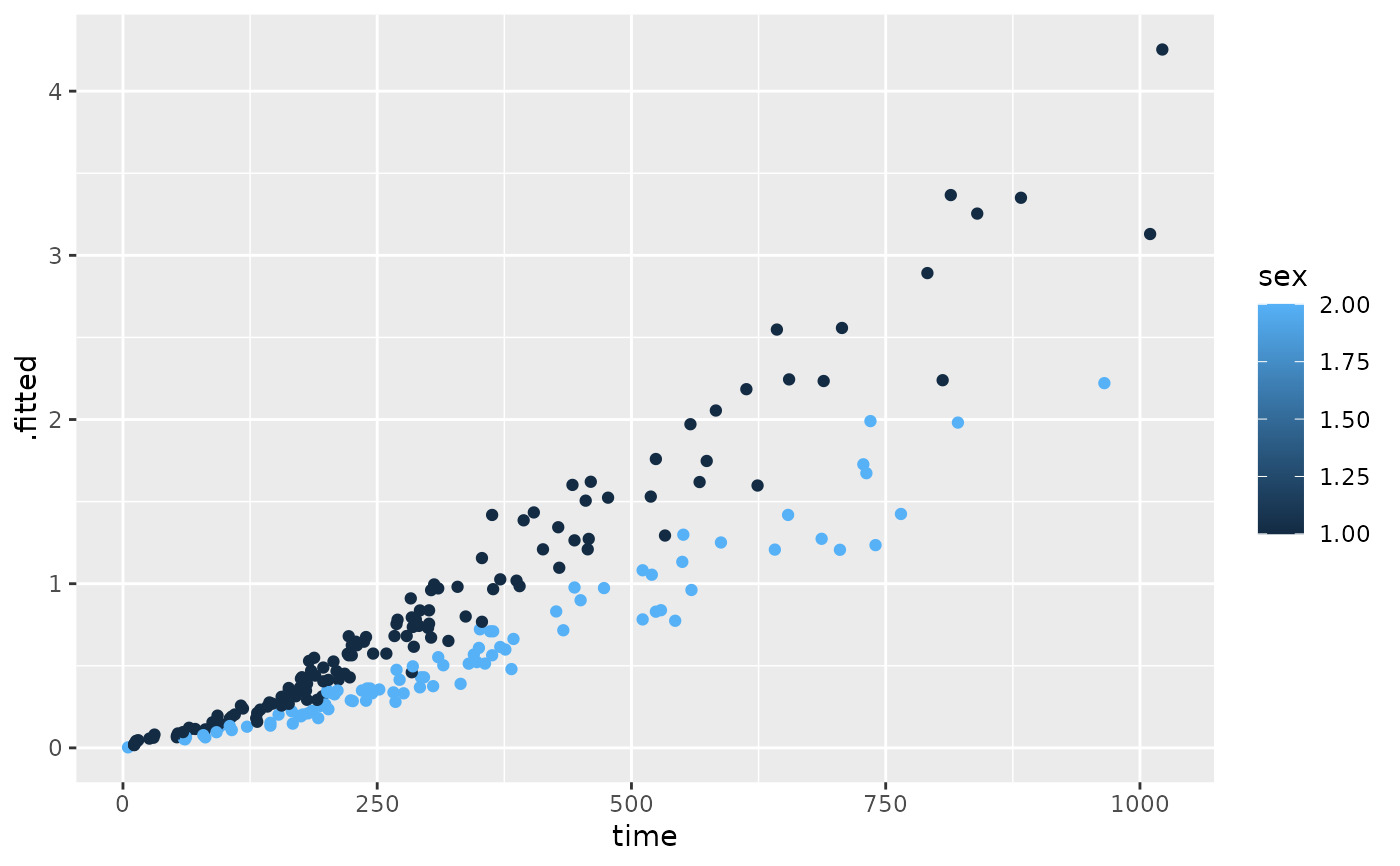Tidy 總結了有關模型組件的信息。模型組件可能是回歸中的單個項、單個假設、聚類或類。 tidy 所認為的模型組件的確切含義因模型而異,但通常是不言而喻的。如果模型具有多種不同類型的組件,您將需要指定要返回哪些組件。
參數
- x
-
從
survival::coxph()返回的coxph對象。 - exponentiate
-
邏輯指示是否對係數估計值取冪。這對於邏輯回歸和多項回歸來說是典型的,但如果沒有 log 或 logit 鏈接,那麽這是一個壞主意。默認為
FALSE。 - conf.int
-
邏輯指示是否在整理的輸出中包含置信區間。默認為
FALSE。 - conf.level
-
用於置信區間的置信水平(如果
conf.int = TRUE)。必須嚴格大於 0 且小於 1。默認為 0.95,對應於 95% 的置信區間。 - ...
-
對於
tidy(),附加參數傳遞給summary(x, ...)。否則忽略。
也可以看看
其他 coxph 整理器:augment.coxph()、glance.coxph()
其他生存整理器:augment.coxph() , augment.survreg() , glance.aareg() , glance.cch() , glance.coxph() , glance.pyears() , glance.survdiff() , glance.survexp() , glance.survfit() , glance.survreg() , tidy.aareg() , tidy.cch() , tidy.pyears() , tidy.survdiff() , tidy.survexp() , tidy.survfit() , tidy.survreg()
值
帶有列的 tibble::tibble():
- estimate
-
回歸項的估計值。
- p.value
-
與觀察到的統計量相關的兩側 p 值。
- statistic
-
在回歸項非零的假設中使用的 T-statistic 的值。
- std.error
-
回歸項的標準誤差。
例子
# load libraries for models and data
library(survival)
# fit model
cfit <- coxph(Surv(time, status) ~ age + sex, lung)
# summarize model fit with tidiers
tidy(cfit)
#> # A tibble: 2 × 5
#> term estimate std.error statistic p.value
#> <chr> <dbl> <dbl> <dbl> <dbl>
#> 1 age 0.0170 0.00922 1.85 0.0646
#> 2 sex -0.513 0.167 -3.06 0.00218
tidy(cfit, exponentiate = TRUE)
#> # A tibble: 2 × 5
#> term estimate std.error statistic p.value
#> <chr> <dbl> <dbl> <dbl> <dbl>
#> 1 age 1.02 0.00922 1.85 0.0646
#> 2 sex 0.599 0.167 -3.06 0.00218
lp <- augment(cfit, lung)
risks <- augment(cfit, lung, type.predict = "risk")
expected <- augment(cfit, lung, type.predict = "expected")
glance(cfit)
#> # A tibble: 1 × 18
#> n nevent statistic.log p.value.log statistic.sc p.value.sc
#> <int> <dbl> <dbl> <dbl> <dbl> <dbl>
#> 1 228 165 14.1 0.000857 13.7 0.00105
#> # ℹ 12 more variables: statistic.wald <dbl>, p.value.wald <dbl>,
#> # statistic.robust <dbl>, p.value.robust <dbl>, r.squared <dbl>,
#> # r.squared.max <dbl>, concordance <dbl>, std.error.concordance <dbl>,
#> # logLik <dbl>, AIC <dbl>, BIC <dbl>, nobs <int>
# also works on clogit models
resp <- levels(logan$occupation)
n <- nrow(logan)
indx <- rep(1:n, length(resp))
logan2 <- data.frame(
logan[indx, ],
id = indx,
tocc = factor(rep(resp, each = n))
)
logan2$case <- (logan2$occupation == logan2$tocc)
cl <- clogit(case ~ tocc + tocc:education + strata(id), logan2)
tidy(cl)
#> # A tibble: 9 × 5
#> term estimate std.error statistic p.value
#> <chr> <dbl> <dbl> <dbl> <dbl>
#> 1 toccfarm -1.90 1.38 -1.37 1.70e- 1
#> 2 toccoperatives 1.17 0.566 2.06 3.91e- 2
#> 3 toccprofessional -8.10 0.699 -11.6 4.45e-31
#> 4 toccsales -5.03 0.770 -6.53 6.54e-11
#> 5 tocccraftsmen:education -0.332 0.0569 -5.84 5.13e- 9
#> 6 toccfarm:education -0.370 0.116 -3.18 1.47e- 3
#> 7 toccoperatives:education -0.422 0.0584 -7.23 4.98e-13
#> 8 toccprofessional:education 0.278 0.0510 5.45 4.94e- 8
#> 9 toccsales:education NA 0 NA NA
glance(cl)
#> # A tibble: 1 × 18
#> n nevent statistic.log p.value.log statistic.sc p.value.sc
#> <int> <dbl> <dbl> <dbl> <dbl> <dbl>
#> 1 4190 838 666. 1.90e-138 682. 5.01e-142
#> # ℹ 12 more variables: statistic.wald <dbl>, p.value.wald <dbl>,
#> # statistic.robust <dbl>, p.value.robust <dbl>, r.squared <dbl>,
#> # r.squared.max <dbl>, concordance <dbl>, std.error.concordance <dbl>,
#> # logLik <dbl>, AIC <dbl>, BIC <dbl>, nobs <int>
library(ggplot2)
ggplot(lp, aes(age, .fitted, color = sex)) +
geom_point()
 ggplot(risks, aes(age, .fitted, color = sex)) +
geom_point()
ggplot(risks, aes(age, .fitted, color = sex)) +
geom_point()
 ggplot(expected, aes(time, .fitted, color = sex)) +
geom_point()
ggplot(expected, aes(time, .fitted, color = sex)) +
geom_point()

相關用法
- R broom tidy.coeftest 整理 a(n) coeftest 對象
- R broom tidy.confint.glht 整理 a(n) confint.glht 對象
- R broom tidy.confusionMatrix 整理一個(n)confusionMatrix對象
- R broom tidy.cv.glmnet 整理 a(n) cv.glmnet 對象
- R broom tidy.cch 整理 a(n) cch 對象
- R broom tidy.cld 整理 a(n) cld 對象
- R broom tidy.clmm 整理 a(n) clmm 對象
- R broom tidy.clm 整理 a(n) clm 對象
- R broom tidy.crr 整理 a(n) cmprsk 對象
- R broom tidy.robustbase.glmrob 整理 a(n) glmrob 對象
- R broom tidy.acf 整理 a(n) acf 對象
- R broom tidy.robustbase.lmrob 整理 a(n) lmrob 對象
- R broom tidy.biglm 整理 a(n) biglm 對象
- R broom tidy.garch 整理 a(n) garch 對象
- R broom tidy.rq 整理 a(n) rq 對象
- R broom tidy.kmeans 整理 a(n) kmeans 對象
- R broom tidy.betamfx 整理 a(n) betamfx 對象
- R broom tidy.anova 整理 a(n) anova 對象
- R broom tidy.btergm 整理 a(n) btergm 對象
- R broom tidy.roc 整理 a(n) roc 對象
- R broom tidy.poLCA 整理 a(n) poLCA 對象
- R broom tidy.emmGrid 整理 a(n) emmGrid 對象
- R broom tidy.Kendall 整理 a(n) Kendall 對象
- R broom tidy.survreg 整理 a(n) survreg 對象
- R broom tidy.ergm 整理 a(n) ergm 對象
注:本文由純淨天空篩選整理自等大神的英文原創作品 Tidy a(n) coxph object。非經特殊聲明,原始代碼版權歸原作者所有,本譯文未經允許或授權,請勿轉載或複製。
